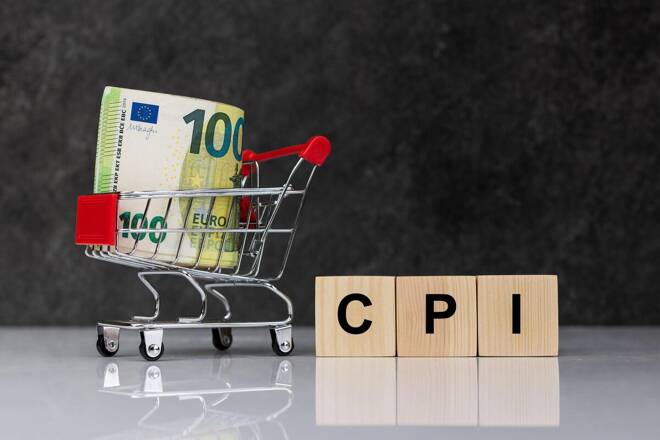Advertisement
Advertisement
German Inflation Softens but Energy Price Inflation Reignites
By:
German inflation softened in April. However, the figures are unlikely to ease pressure on the ECB to deliver further policy moves to target core inflation.
It is a relatively quiet day on the European economic calendar. However, finalized German inflation figures for April drew interest.
According to the finalized German CPI report, Germany’s annual inflation rate softened from 7.4% to 7.2% in April, unchanged from the prelim figure. Significantly, the harmonized index of consumer prices (HICP) rose by 7.6% year-over-year versus 7.8% in March.
According to Destatis,
- Energy prices accelerated in April, rising by 6.8% year-over-year after increasing by 3.5% in March.
- Household energy prices (total) were up 21.1% compared with April 2022. Natural gas prices (+33.8%) and prices for firewood, wood pellets, and other solid fuels (+29.8%) reignited energy price pressures.
- Food price inflation slowed from 22.3% to 17.2% in April but remained elevated.
- Excluding energy and food, the inflation rate stood at 5.8%, reflecting the impact of food and energy prices on headline inflation and consumers.
Inflation is the hot topic of the week among central bankers. ECB members focused on inflation this week, with Chief Economist Philip Lane and Executive Board member Isabel Schnabel delivering hawkish speeches.
On Tuesday, Isabel Schnabel remained hawkish, warning the markets of more rate hikes until core inflation softens. Schnabel had this to say,
“Based on today’s data, there is no doubt that we have to do more to bring inflation back to our 2% target in a timely manner. We will raise rates decisively until it becomes clear that core inflation is also declining on a sustained basis.”
ECB Chief Economist Philip Lane referred to inflation on Monday, saying,
“There’s a lot of disinflation coming this year (but) not quite yet. We’re still (seeing) a lot of momentum in inflation… there’s still momentum in food and core inflation.”
EUR/USD Reaction to German Inflation
Ahead of the German inflation numbers, the EUR/USD fell to an early low of $1.09457 before rising to a pre-stat high of $1.09775.
However, in response to the inflation figures, the EUR/USD rose to a post-stat high of $1.09686 before falling to a low of $1.09644.
This morning, the EUR/USD was up 0.05% to $1.09661.
Up Next
There are no other euro area economic indicators for investors to consider today. Investors should monitor ECB member commentary considering sensitivity to inflation.
However, ECB member chatter with the media will need monitoring, with no ECB members on the calendar to speak today.
Looking ahead to the US session, it is a busy day on the US economic calendar. The all-important US CPI Report will be in the spotlight. Unsurprisingly, investors have been cautious in the lead-up to today’s report. Inflation remains sticky in other economies, and the Fed may face a similar issue.
Hotter-than-expected inflation numbers would fuel bets of a 25-basis point June interest rate hike. Significantly, the markets would delay expectations of an interest rate cut.
With inflation the hot topic, we expect FOMC member commentary to move the dial. On Tuesday, FOMC Vice Chair John Williams shared his views on the economic outlook and monetary policy, saying,
“First of all, we haven’t said we’re done raising rates. We’re going to make sure we’re going to achieve our goals, and we’re going to assess what’s happening in our economy and make the decision based on that data.”
Williams also said he did not have an interest rate cut in his baseline forecast and could hike rates if required.
Beyond the economic calendar, the banking sector, the US debt ceiling, and corporate earnings also need consideration.
About the Author
Bob Masonauthor
With over 28 years of experience in the financial industry, Bob has worked with various global rating agencies and multinational banks. Currently he is covering currencies, commodities, alternative asset classes and global equities, focusing mostly on European and Asian markets.
Advertisement
